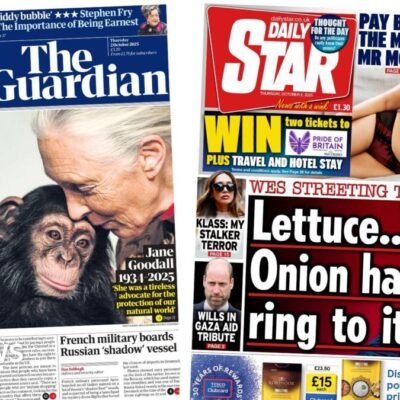THE UK’s rate of inflation remained unchanged last month as food prices unexpectedly dropped.
The Consumer Price Index (CPI) was 3.8% in the 12 months to September, according to the Office for National Statistics (ONS).

Inflation – or CPI – is a measure of how much the price of goods and services is rising or falling, and impacts households’ spending power.
It remained unchanged in September after the cost of food and non-alcoholic drinks fell for the first time since May 2024, the ONS said.
It hit 3.8% in July and August amid pressure from rising food prices, as firms highlighted increased tax and labour costs.
Previously, it hit 3.6% in June, and measured 3.4% in May, down from 3.5% the month before.
Transport costs such as fuel had the biggest impact on last month’s inflation rates. But it was offset by the cost of food and non-alcoholic drinks, as well as live gigs, going down.
Office for National Statistics (ONS) chief economist Grant Fitzner said: “A variety of price movements meant inflation was unchanged overall in September.
“The largest upward drivers came from petrol prices and airfares, where the fall in prices eased in comparison to last year.
“These were offset by lower prices for a range of recreational and cultural purchases including live events.
“The cost of food and non-alcoholic drinks also fell for the first time since May last year.”
September was the 12th month in a row that CPI had remained stubbornly above the Bank of England’s (BoE) target of 2%.
Chancellor Rachel Reeves said she was “not satisfied” with the latest figures, which come ahead of her Autumn Budget on November 26.
“For too long, our economy has felt stuck, with people feeling like they are putting in more and getting less out.
“That needs to change. All of us in government are responsible for supporting the Bank of England in bringing inflation down.
“I am determined to ensure we support people struggling with higher bills and the cost of living challenges, deliver economic growth and build an economy that works for, and rewards, working people,” she added.
Latest figures will come as a relief for Rachel Reeves
Analysis by Ryan Sabey, The Sun’s Economics Editor
Rachel Reeves has been delivered some relatively good news for once as inflation holds steady.
The Chancellor and the Bank of England both know it’s nearly DOUBLE the target rate but it stays steady at 3.8 per cent.
Economists had been predicting that it would be up to 4 per cent.
But experts feel we could be at the peak of the inflation cycle as it comes back to target in the coming year or so.
What the steady inflation rate will do is focus the minds at the Bank and strengthen the case for an interest rate cut by the end of the year.
All eyes will be on the December meeting when the rate-setters meet when they could lower rates.
Many people will now be looking for the Chancellor to help the inflation with action at the Budget.
One area where she is looking at is ‘regulated prices’ such as energy bills and rail prices.
Removing VAT from energy bills, saving the typical household £86 a year, will help bring down inflation.
In her comments this morning, the Chancellor says those in government have a responsibility for bringing down inflation.
She insists she is “determined” to make this happen. All eyes on her Budget at the end of next month to see where the help falls.
However, the figure was also lower than what had been predicted by economists.
Experts from Pantheon Macroeconomics had estimated that inflation would rise to 4% last month due to higher motor fuel and airfare prices, as well as “strong clothes prices”.
It was also predicted that a hike to private school fees would have an impact.
Some schools were expected to increase fees from the start of the new school year as they staggered higher costs for parents after the Government introduced a 20% VAT rate for private school fees.
The Bank of England (BoE) also previously forecast that inflation would peak at around 4% in September before steadily falling.
The September inflation rate is typically used to decide the level of increase for many benefits, such as universal credit, tax credits and disability benefits.
What does it mean for my money?
Rising inflation means goods and services like food, entertainment, fuel, and clothes cost more.
It means prices will rise faster, pushing up the cost of household bills for millions, while salaries don’t necessarily go up.
However, the ONS the cost of food had gone down last month for the first time since May last year, which will come as welcome news to households who have been facing rapidly rising grocery prices.
The Bank of England may keep interest rates higher for longer to control inflation, which could mean that mortgage rates will rise again.
This would also make it more expensive to borrow money, for example through a credit card.
Rising inflation also means any money you have in savings accounts is earning less interest in real terms.
David Murray, head of advice at Aberdeen Financial Planning, said: “Rising inflation eats away at your money in real terms, so if you’re able to save or invest, it’s vital to check your finances are pulling their weight.
“That might mean moving cash into a better savings rate, reviewing your ISA options, or making use of pension tax reliefs.”
Why does inflation matter?
INFLATION is a measure of the cost of living. It looks at how much the price of goods, such as food or televisions, and services, such as haircuts or train tickets, has changed over time.
Usually people measure inflation by comparing the cost of things today with how much they cost a year ago. The average increase in prices is known as the inflation rate.
The government sets an inflation target of 2%.
If inflation is too high or it moves around a lot, the Bank of England says it is hard for businesses to set the right prices and for people to plan their spending.
High inflation rates also means people are having to spend more, while savings are likely to be eroded as the cost of goods is more than the interest we’re earning.
Low inflation, on the other hand, means lower prices and a greater likelihood of interest rates on savings beating the inflation rate.
But if inflation is too low some people may put off spending because they expect prices to fall. And if everybody reduced their spending then companies could fail and people might lose their jobs.
See our UK inflation guide and our Is low inflation good? guide for more information.








